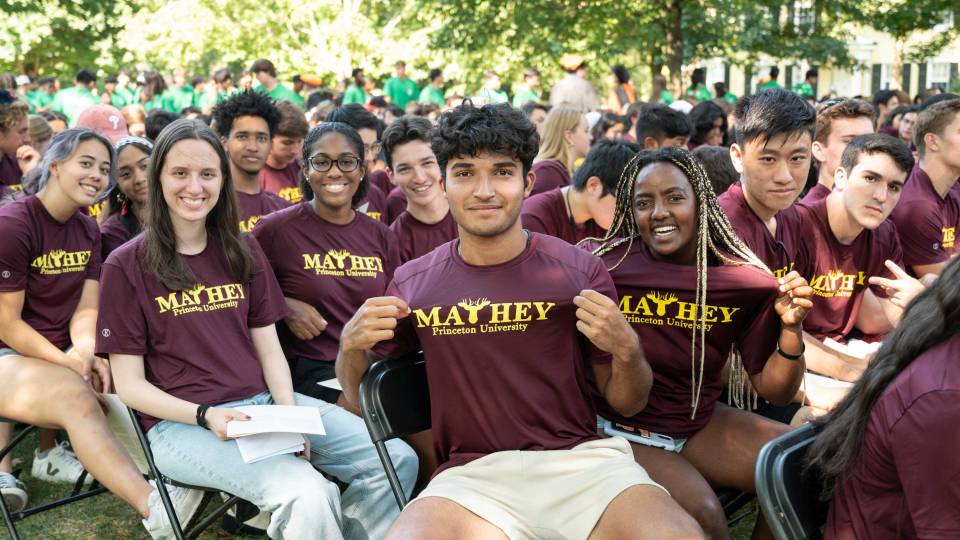The Great Class of 2026 marches in the Pre-rade following Sunday’s Opening Exercises, which marked the start of the academic year at Princeton.
President Christopher L. Eisgruber officially welcomed the Class of 2026 to Princeton during Opening Exercises on Sunday, Sept. 4, and encouraged first-years to be fully present during their time as Princeton students.

Princeton President Christopher L. Eisgruber addresses Princeton’s newest students, underscoring the value of presence and place in our lives.
"For me, at least, our extended experience with 'social distancing' and remoteness has highlighted the value of presence and place in our lives," Eisgruber said in his address. “As we begin a new year, and all of you in the Class of 2026 begin your undergraduate careers at Princeton, I want to urge you to be fully present in this special and marvelous place, now and throughout your time here.”
Eisgruber said he was grateful to gather with incoming students, who were seated on the lawn in front of Nassau Hall wearing their colorful residential college t-shirts. Opening Exercises, the annual ceremony that marks the start of each academic year, dates to at least 1802 and has been held in several different locations on campus. The interfaith ceremony featured an address by Eisgruber as well as hymns, readings, prayers and the awarding of undergraduate academic prizes.
“I have always enjoyed the energy of Opening Exercises and the feelings of renewal and promise that accompany them,” Eisgruber said. “Our gradual recovery from the long pandemic has heightened that sense of joy. I savor the chance to participate again in this ritual and others where we forge and reinforce the bonds that tie the members of this University to one another, to this remarkable place, and to our shared mission of teaching and research.”
“Being fully present at Princeton means, among other things, taking advantage of the co-curricular and extra-curricular opportunities that are essential to a liberal arts education," Eisgruber said. He offered a number of ways students could practice that presence, including making service and civic engagement a substantial part of their undergraduate careers, attending some of the University’s countless athletic and artistic events, appreciating the beauty of Princeton’s campus, and enjoying moments of solitude, sometimes even sans phone.

Students from Matthey College and the new Yeh College wait for Opening Exercises to begin outside Nassau Hall.
“Give yourself a chance to get lost in thought,” Eisgruber said. “That is, after all, part of what college is about. It is easy to do in this place, if you let it happen, but very hard to do on Zoom.”
As another way to be fully present, he urged the students to get to know their professors personally. “Faculty members at Princeton are extraordinary scholars, and they are also, if I may say so, interesting people,” he said. “The opportunity to meet and interact with them sets this place apart from most other research universities.”
Eisgruber noted how presence and place were also themes in this year’s Princeton’s Pre-Read, “Every Day the River Changes: Four Weeks Down the Magdalena,” by Class of 2019 graduate Jordan Salama, which first-year students discussed Sunday with Eisgruber and Salama during the Pre-Read Assembly in Jadwin Gymnasium.

The first-year students take in the pageantry of the Opening Exercises procession.
"And, of course, I hope that you will get to know one another," Eisgruber said in conclusion at Opening Exercises. "The opening of Yeh College and New College West means that the Great Class of 2026 is the largest undergraduate class in the history of this University. I am excited about that, because every single one of you brings special talent, valuable perspective, and distinctive excellence to this University."
“Rarely if ever in your lives will you be surrounded by such an extraordinary and dynamic group of people as during your time on this campus,” he said. “You will benefit tremendously if you can approach your classmates in the way that Jordan Salama got to know the people he met on his travels: with respect, kindness, curiosity, warmth, and a real desire to learn and communicate across differences."
Following the ceremony, the Class of 2026 marched to Cannon Green for the Pre-rade, accompanied by the Princeton University Band. Alumni and other guests cheered for the first-years waving orange and black flags. Sunday was part of a week of Orientation activities before classes for all undergraduates begin on Tuesday, Sept. 6.
Last week, students participated in one of Princeton’s three small group experiences — Community Action, Dialogue and Difference in Action, and Outdoor Action — and attended other events meant to help first-years bond and to support their transition to college life.
Community Action, coordinated by the John H. Pace ’39 Center for Civic Engagement, introduces first-year students to community at Princeton and beyond. Dialogue and Difference in Action provides an opportunity to engage in critical conversations around identity, power, privilege and difference — both in the context of the Princeton University community and society at large. Outdoor Action lets incoming undergraduates disconnect from their many responsibilities and distractions to establish new friendships through activities such as camping, canoeing, biking and hiking.

African drum music heralds the arrival of the new class and the 2022-23 academic year.
Opening Exercises and the Pre-rade can be viewed on the University’s Facebook page. Opening Exercises will be archived online for later viewing.














